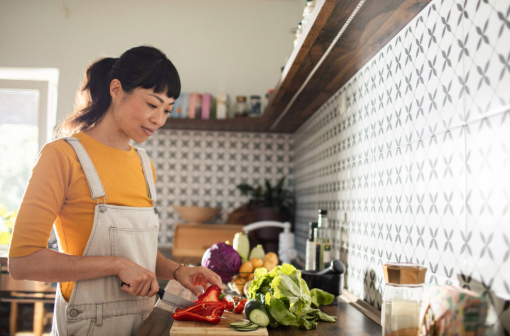“I’d make it a priority to go see your GP for a check-up and routine age-based screening. Get some blood tests, blood pressure, BMI, waist circumference and skin checks done.” —Rebecca Windsor, CEO of Private Health Insurance, Australian Unity
Key points
- During the COVID-19 pandemic, many Australians (understandably) neglected routine medical, dental and other checks—so now is the time to start making those appointments again.
- Dental health checks were among the most common appointments to fall by the wayside.
- Check-ups help to ensure the early detection of an illness or disease. If you don’t go, you won’t know—which means you can’t prevent or treat the issue at hand.
The benefits of preventative care might seem obvious—it’s all about catching things early and managing them before they become a serious problem. But two years of COVID-19 restrictions saw many Australians skip, postpone or forget key health checks and allied health appointments.
Perhaps that’s one reason why the 38th Australian Unity Wellbeing Index—a 20-year study into the wellbeing of Australians, created in partnership with Deakin University—shows that our satisfaction with our health plummeted in 2021, falling outside of the average range for the first time on record.
If you’ve let things slip, now is the time to get back on track with visits to your GP, dentist, osteo or optometrist. You’ll be doing your future self a favour.
The importance of cancer screening
There are two forms of preventative care, explains Dr Nancy Huang, Australian Unity’s Chief Medical Adviser: professionally led and self-directed.
Professionally led preventative care covers things like cancer screening and skin checks, which should become an increasing priority as we age, and “especially as we get over the 50-year-old group,” says Nancy. “Those recommendations for regular and professionally led detection of cancer means that we can get on to it early and sometimes even catch things at the pre-cancer stage.”
Unfortunately, data from the Australian Institute of Health and Welfare shows participation in national screening programs around breast cancer, cervical cancer and bowel cancer reduced during COVID-19.

The tooth hurts
Being physically active, stopping smoking or monitoring how much alcohol you drink all falls under the category of self-directed care, explains Nancy—as does keeping up with osteo, physio, chiropractor or massage appointments, and getting your hearing, eyes and teeth checked.
But during the pandemic, many Australians dropped their oral health and hygiene check-ups.
“Probably the most observable trend in our portfolio would have been dental, where people weren’t going to the dentist for their regular checkups,” says Rebecca Windsor, CEO of Private Health Insurance at Australian Unity.
Even when the restrictions lifted, people were hesitant to go back, she adds—which is a problem. This is because your oral health is often an indicator of your overall health, with Rebecca noting that “poor oral health can be associated with a greater risk of cardiovascular, respiratory disease, dementia and endocarditis”.
Nancy agrees: “Dental care is absolutely critical and an undervalued component to our health. Our oral health really determines our diet, and therefore our nutrition, which in turn determines our ongoing wellbeing and physical health.”
Catching up on vaccinations
Rebecca’s data shows that vaccinations are another area of preventative care that we’ve let slip over the past couple of years.
“Interestingly, there’s been an overall decline in routine vaccinations over the pandemic period, so check your vaccinations and ensure you’re up to date,” she says. “Clearly, we need COVID-19 and flu vaccines, but more broadly across the Australian population there has been a reduction in routine vaccinations.”
There are a number of recommended vaccines for people in different age groups, says Nancy. These include inoculations against pneumococcal disease and shingles, as well as boosters against mumps and rubella, tetanus, diphtheria and whooping cough.
Staying on top of our mental health
And then there is mental health—another area that needs support and careful management from a preventative care point of view.
The COVID-19 pandemic has been an emotional minefield, and Kate Lycett, lead researcher of the Australian Unity Wellbeing Index at Deakin University’s School of Psychology, thinks this could have contributed to the reduced satisfaction with our health in 2021.
“I think in the media, everywhere you looked, people were talking about mental illness and the impacts of the pandemic on people's mental health,” she says. “And there's absolutely no doubt at all that people's lives were put under more mental distress during the pandemic—and that's just by looking at the hospital admissions, and the calls to services like Lifeline.”
In fact, the Australian Unity Wellbeing Index found that scores on all three measures of mental distress—anxiety, stress and depression—were about 10 points higher (i.e. worse) during the second year of the pandemic compared to our 2013 survey.
If you can afford it, having someone to talk to about how you’re feeling from a mental health perspective is an important element of preventative care, Nancy says. It helps you think about and contextualise what you’re thinking and feeling “before you get to the stage of going through an acute crisis or experiencing further psychological distress”.
There are also free tools you can use to help monitor how you’re travelling, including journaling and meditation.

Let your GP guide you
With so much to catch up on, where do you start with it all?
“I’d make it a priority to go see your GP for a check-up and routine age-based screening,” says Rebecca. “Get some blood tests, blood pressure, BMI, waist circumference and skin checks done.”
Your GP may also offer some insight into other areas of preventive care you might want to tap into, from mental health to podiatry.
“Absolutely one of the key factors to a person maintaining wellbeing and good health throughout their lifespan is having a good relationship with their GP,” says Nancy.
It’s one thing to get your prescriptions renewed via telehealth, she adds, but when was the last time you went in and had some face time with your GP?
“To physically see you walk into the consultation room gives the GP a clearer idea of your mobility, your balance and where you're at,” says Nancy. “So your consultation with your GP can really help set up those sorts of preventative conversations.”
Prevention is better than cure
The take-home message here is that preventative care sets you up for your best life. Whether self-directed or professionally led, it can increase mobility, decrease pain and suffering, and improve social connections—all of which supports our Real Wellbeing.
“Prevention is not just about stopping something happening—prevention in Australia is actually about early detection and trying to get on to it before it then manifests in a much more severe form,” says Nancy.
“Because preventative care doesn't just stop something from happening. If you've got diabetes, or if you've already got some hardening of your arteries, you can't actually cure it,” Nancy adds. “But, as part of your prevention journey, you can stop it from deteriorating more rapidly.”

Disclaimer: Information provided in this article is not medical advice and you should consult with your healthcare practitioner. Australian Unity accepts no responsibility for the accuracy of any of the opinions, advice, representations or information contained in this publication. Readers should rely on their own advice and enquiries in making decisions affecting their own health, wellbeing or interest


